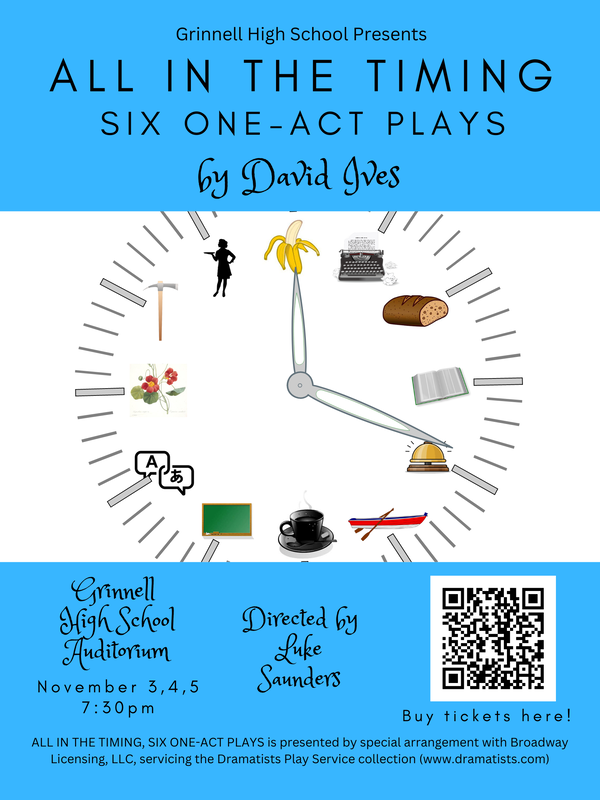|
The Grinnell High School Curtain Club and Thespians present, “All in the Timing” by David Ives. The production consists of six one-act plays: Sure Thing; Words, Words, Words; The Universal Language; Philip Glass Buys a Loaf of Bread; The Philadelphia; and variations on the Death of Trotsky. The production is under the direction of Luke Saunders.
Performances will be Nov. 3 - 5 at 7:30 p.m. in the Grinnell High School Auditorium. Tickets can be purchased at https://www.vancoevents.com/us/eventlist/ghs for $8.79. Basic plots for each of the one-acts: Sure Thing - A man tries to ask a woman out on a date, and every time either of them jeopardizes that outcome, the scene resets to an earlier point and they try again. Actors - Bill: Toby Crandall; Betty: Olivia Mick. Words, Words, Words - A scientist tests whether a certain number of monkeys typing randomly on typewriters could ever produce Hamlet. Actors - Milton: Elisabeth Kelley-Chown; Swift: Billy Lopatto; and Kafka: Emily Cooper. The Universal Language - A woman wants to learn a new universal language and the man teaching the language only wants her money. At first. Actors - Dawn: Catherine Schubert; Don: Tiernan Boggs; and Young Man: Isaac Hammond. Philip Glass Buys a Loaf of Bread - The composer Philip Glass buys a loaf of bread in the style of Einstein on the Beach. Actors - Baker: Joel Dressler; Philip Glass: Isaac Zaret; 1st Woman: Mackenzie Kohl; and 2nd Woman: Olivia Mick. The Philadelphia - A man finds himself trapped in a metaphysical Philadelphia where he can’t get what he wants and nothing goes his way. Actors - Al: Tiernan Boggs; Mark: Thea Sherman; and Waitress: Emily Cooper. Variations on the Death of Trotsky - Leon Trotsky dies after an assassin smashes a mountain climbing axe into his skull. Then, while trying to evade death, he dies seven more times. Actors - Leon Trotsky: Jeslyn Voogd; Mrs. Trotsky: Peyton Stevenson; and Ramón: Isaac Hammond. Saunders said he selected this collection because exposure to these plays will help the student actors when they encounter the works of J.B. Priestly, Philip Glass, 20th-century absurdist playwrights and Shakespeare. “They also have opportunities to find meaning in repetition and seeming nonsense. Ives makes a lot of connections with existing plays and other literature, so just the process of understanding the references and jokes introduces the students to a lot that I hope they will explore more on their own,” noted Saunders. “He also plays with language to the point of making up a new one in one of the plays. Discussing linguistic choices made by characters helps students understand more about the characters' backgrounds and how they think.”
0 Comments
Leave a Reply. |
Archives
July 2024
Categories |


 RSS Feed
RSS Feed